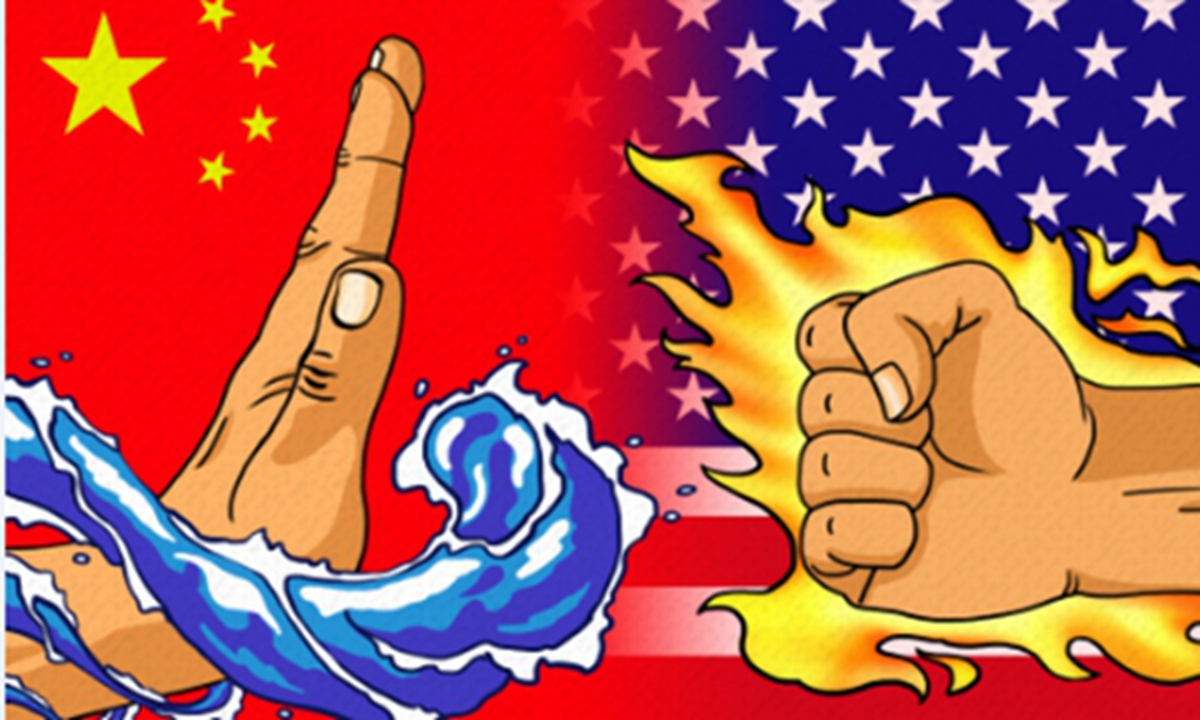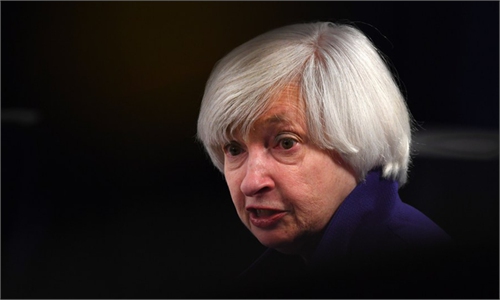Is it arrogance or inferiority to engage in ‘critical dialogue’ with China?: Global Times editorial

China US Illustration: Liu Rui/GT
The Chinese-language website of Deutsche Welle on Tuesday published a commentary entitled "Maintaining critical dialogue with China is more important than ever." The article is filled with clichés about so-called "human rights issues in Xinjiang," which are not worth reading. But the phrase "critical dialogue" in the headline is intriguing. It is in fact the main attitude of the US and other Western countries in communicating with non-Western nations in recent years.
This is, in most cases, an unconscious revelation of American and Western elites' inner feeling of superiority. But now they put it forward consciously and promote it as an "effective way" to deal with China. This cannot be explained simply by "pride and prejudice." They did not articulate it in the past, but Western countries have been practicing and enhancing the so-called critical dialogue with China. It has become an approach or even a weapon in the West's strategic game with China. In other words, they are trying to "lecture" China under the cover of "dialogue."
In global interactions, disagreements are common. It is also normal to express different views or even criticize without mincing words. However, equal dialogue cannot be based on the premise that some values are superior to others. It also cannot be only one party lecturing or accusing the other. The US and the West's "critical dialogue" is condescending, and the implied logic is that only they have the ability, qualification and power to determine right and wrong. This means that one party already claimed the moral high ground before the "dialogue" even begins, which dwarfs the development level and moral image of other countries.
Colonialism has long been discarded as something despicable, but Western-centric power structures and mentality have not disappeared completely. Colonialism has been subtly transplanted into various aspects, lurking in Western political language and communication methods. Some elites in the US and the West, with a strong sense of superiority on civilization, regard non-Western countries as candidates waiting for their "approval." With ideological pointers in their hands, they took to the podium to oversee exams, judge papers, and then grade them based on the "performance" of these countries to determine whether they passed the exam. As for the standard of scoring, it is drawn by the US and the West according to their own historical and social formations, and "Western-centrism" is the only correct answer in all the exams.
In their eyes, only the West is right, civilized and advanced, while those who differ from them are branded as "evil," barbaric and backward. They forcibly create a dichotomy between "civilization" and "barbarism." On this fictional premise, they attach moral labels on different practices of other countries, trying to dwarf them in image so that they can "attack others from a high position" as they wish. It is for this reason they recklessly fabricate the lie of "genocide" in Xinjiang, audaciously call for "punishing China" by various means, and frantically threaten to bomb China "back into the Stone Age."
Sometimes, arrogance is a kind of overbearingness; sometimes, it is also a kind of deep inferiority. In the face of the rise of emerging market countries, including China, and their own troubles, the US and other Western countries are becoming increasingly overwhelmed. Faced with the narrowing gap between them and emerging market countries, they have to rely on slogans of "human rights" and "democracy" to maintain their "absolute advantage." The reason why they are so sensitive to their position in the dialogue is that they are aware of the disappearance of the absolute advantage they used to have. As a result, they have to deliberately highlight their discourse power to maintain the obsolete power structure behind it, which has become a subconscious reaction.
Even in the fields of human rights and democracy, the US and the West are increasingly lagging behind, relying only on slogans, posturing and fist-pumping to show their "self-esteem," which is actually laughable to the rest of the world. The West's self-confidence is collapsing, as the democratization of international relations is increasingly popular and as developing countries' awareness of their rights is strengthening. Today, if someone still wants to engage in colonialism and ideological hegemony, or even imagines leading other countries by the nose like livestock, no country with national pride and a sense of independence will obey.
Returning to the "critical dialogue," China has never been afraid of criticism, but firmly opposes hegemony. Times have changed, and US and Western elites should learn to be equal and respectful. Dialogue is necessary, and we welcome "constructive dialogue," but we reject "critical dialogue." We would also like to remind that a condescending posture is dangerous, because the farther you are from the ground, the harder you may fall.

